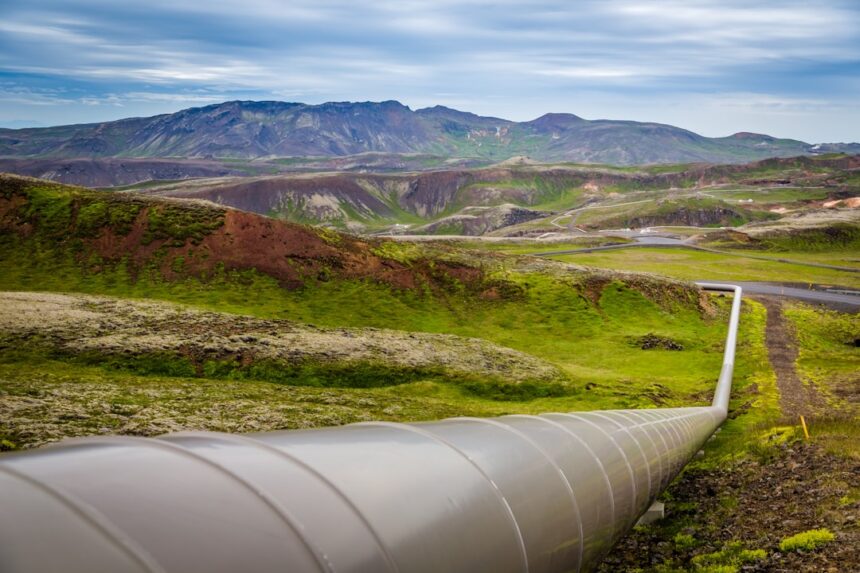Geopolitical pipeline attacks represent a significant threat to global energy security, often driven by political motives and regional conflicts. These attacks can take various forms, including sabotage, cyber intrusions, and physical assaults on infrastructure. The motivations behind such actions are typically rooted in broader geopolitical tensions, where control over energy resources becomes a strategic objective.
As nations vie for power and influence, pipelines—critical conduits for oil and gas—become prime targets. Understanding the dynamics of these attacks requires a comprehensive analysis of the geopolitical landscape, where energy resources are not merely commodities but instruments of power. The complexity of geopolitical pipeline attacks is further compounded by the intricate web of alliances and rivalries that characterize international relations.
For instance, a nation may target a pipeline not only to disrupt its adversary’s energy supply but also to send a message to allies and neutral parties about its capabilities and resolve. This interplay of power dynamics makes it essential for policymakers and security experts to remain vigilant and proactive in safeguarding energy infrastructure. The implications of such attacks extend beyond immediate disruptions; they can reshape energy markets, alter diplomatic relations, and even trigger military responses.
Key Takeaways
- Geopolitical pipeline attacks can disrupt energy flows and have significant economic and environmental consequences.
- Historical examples show that pipeline attacks have been used as a tool in geopolitical conflicts and wars.
- Cyber warfare plays a significant role in disrupting energy flows through pipeline attacks.
- Pipeline attacks can lead to economic instability and affect global energy prices.
- Diversifying energy sources is crucial in mitigating the impact of pipeline attacks and ensuring energy security.
The Impact of Pipeline Attacks on Energy Security
The ramifications of pipeline attacks on energy security are profound and multifaceted. When a pipeline is compromised, the immediate effect is often a disruption in the supply chain, leading to shortages and price volatility in global energy markets. Such disruptions can have cascading effects on economies that rely heavily on imported energy, resulting in increased costs for consumers and businesses alike.
The unpredictability associated with these attacks can also deter investment in energy infrastructure, as companies may be reluctant to commit resources to projects in regions perceived as unstable or hostile. Moreover, the impact of pipeline attacks extends beyond economic considerations; they can also have significant geopolitical consequences. Nations that experience disruptions may seek to diversify their energy sources or forge new alliances to mitigate risks.
This shift can lead to a reconfiguration of global energy partnerships, as countries reassess their dependencies on specific suppliers or transit routes. In this context, pipeline attacks serve as a catalyst for broader changes in energy policy and international relations, highlighting the interconnectedness of energy security and geopolitical stability.
Historical Examples of Geopolitical Pipeline Attacks

Throughout history, there have been numerous instances of geopolitical pipeline attacks that illustrate the strategic importance of energy infrastructure. One notable example is the sabotage of the Druzhba pipeline in 2006, which transported oil from Russia to Europe. This incident was attributed to tensions between Russia and Ukraine, showcasing how regional conflicts can escalate into direct attacks on critical infrastructure.
The disruption not only affected oil supplies but also strained diplomatic relations between Russia and several European nations, underscoring the far-reaching implications of such actions. Another significant case occurred in 2011 when the Trans-Saharan pipeline project faced multiple attacks in Nigeria. Armed groups targeted the pipeline as part of their broader campaign against the Nigerian government, aiming to assert control over local resources.
These attacks not only disrupted oil exports but also highlighted the challenges faced by governments in securing energy infrastructure against non-state actors. The historical context of these examples reveals a pattern where geopolitical tensions manifest through targeted assaults on pipelines, emphasizing the need for robust security measures.
The Role of Cyber Warfare in Disrupting Energy Flows
| Metrics | Data |
|---|---|
| Number of cyber attacks on energy infrastructure | Increasing trend over the past decade |
| Impact on energy supply | Disruption of energy flows, leading to power outages |
| Cost of cyber attacks on energy sector | Billions of dollars in damages and recovery costs |
| Response and defense measures | Investment in cybersecurity technologies and protocols |
In recent years, cyber warfare has emerged as a formidable tool for disrupting energy flows, complementing traditional forms of pipeline attacks. Cyberattacks can target the operational technology that controls pipeline systems, leading to significant disruptions without the need for physical sabotage. For instance, the 2021 Colonial Pipeline ransomware attack in the United States exemplified how cyber threats can paralyze critical infrastructure, resulting in fuel shortages across several states.
This incident highlighted vulnerabilities within energy systems and raised awareness about the need for enhanced cybersecurity measures. The increasing reliance on digital technologies in managing energy infrastructure has made pipelines more susceptible to cyber threats. As operators integrate advanced monitoring systems and automation into their operations, they inadvertently create new entry points for malicious actors.
The potential consequences of such cyberattacks extend beyond immediate operational disruptions; they can also erode public trust in energy providers and raise concerns about national security. Consequently, addressing the challenges posed by cyber warfare is essential for safeguarding energy flows and ensuring resilience against future threats.
The Economic Consequences of Pipeline Attacks
The economic consequences of pipeline attacks are often immediate and severe, affecting not only the targeted nation but also global markets. When a pipeline is attacked, it can lead to sudden spikes in oil and gas prices due to perceived supply shortages. This volatility can have ripple effects across various sectors, from transportation to manufacturing, ultimately impacting consumers through higher prices for goods and services.
Additionally, countries that rely heavily on energy exports may experience significant revenue losses, which can destabilize their economies and lead to broader social unrest. Beyond short-term economic impacts, pipeline attacks can also deter foreign investment in affected regions. Investors typically seek stability and predictability when committing capital to energy projects; however, repeated attacks create an environment of uncertainty that can drive investment away.
This withdrawal can hinder long-term development efforts and exacerbate existing economic challenges. As nations grapple with the fallout from such attacks, they may be forced to reassess their energy strategies and seek alternative sources or routes to ensure stability.
Strategies for Preventing and Responding to Pipeline Attacks

To mitigate the risks associated with pipeline attacks, governments and energy companies must adopt comprehensive strategies that encompass prevention, response, and recovery. One effective approach involves enhancing physical security measures around critical infrastructure.
By fortifying physical defenses, stakeholders can deter potential attackers and minimize the likelihood of successful assaults. In addition to physical security enhancements, fostering collaboration between public and private sectors is crucial for developing effective response strategies. Information sharing between governments, law enforcement agencies, and energy companies can facilitate timely responses to emerging threats.
Furthermore, conducting regular risk assessments and scenario planning exercises can help stakeholders identify vulnerabilities and develop contingency plans for various attack scenarios. By adopting a proactive stance toward security, nations can better protect their energy infrastructure from geopolitical threats.
The Environmental Impact of Geopolitical Pipeline Attacks
Geopolitical pipeline attacks not only pose risks to energy security but also have significant environmental implications. When pipelines are sabotaged or damaged, they can result in catastrophic spills that contaminate land and water resources. For instance, oil spills from damaged pipelines can devastate local ecosystems, harming wildlife and disrupting communities that depend on natural resources for their livelihoods.
The environmental consequences of such incidents often extend far beyond the immediate vicinity of the attack, affecting air quality and contributing to long-term ecological degradation. Moreover, the response efforts following a pipeline attack can further exacerbate environmental damage. Cleanup operations may involve heavy machinery that disturbs sensitive habitats or introduces additional pollutants into the environment.
Additionally, if governments prioritize rapid restoration of supply over environmental considerations, they may inadvertently compromise ecological integrity in their haste to resume operations. Therefore, it is essential for policymakers to integrate environmental protection into their strategies for managing pipeline security and responding to attacks.
The Role of International Cooperation in Protecting Energy Infrastructure
International cooperation plays a vital role in safeguarding energy infrastructure from geopolitical threats. Given the interconnected nature of global energy markets, no single nation can effectively address the challenges posed by pipeline attacks in isolation. Collaborative efforts among countries can enhance information sharing regarding potential threats and best practices for securing critical infrastructure.
Joint exercises and training programs can also help build capacity among nations to respond effectively to incidents involving pipeline security. Furthermore, international agreements focused on energy security can establish frameworks for cooperation among nations facing similar risks. These agreements may include provisions for mutual assistance during crises or mechanisms for coordinating responses to cross-border threats.
By fostering a spirit of collaboration and solidarity among nations, stakeholders can create a more resilient global energy landscape capable of withstanding geopolitical challenges.
The Influence of Geopolitical Tensions on Pipeline Security
Geopolitical tensions significantly influence pipeline security by shaping the risk landscape surrounding critical infrastructure. Regions characterized by political instability or conflict are often more susceptible to attacks on pipelines due to weakened governance structures or active hostilities between rival factions. For instance, areas experiencing civil unrest or territorial disputes may see an uptick in sabotage incidents as various groups vie for control over valuable resources.
Moreover, geopolitical rivalries can lead to increased militarization around key pipelines as nations seek to protect their interests from perceived threats. This militarization may manifest through heightened security measures or even military presence along critical transit routes. While such actions may enhance immediate security, they can also escalate tensions between nations and create an environment ripe for conflict.
Thus, understanding the interplay between geopolitical dynamics and pipeline security is essential for developing effective strategies to mitigate risks.
The Future of Geopolitical Pipeline Attacks
As global energy demands continue to evolve alongside shifting geopolitical landscapes, the future of geopolitical pipeline attacks remains uncertain yet concerning. With emerging technologies such as artificial intelligence and advanced cyber capabilities becoming more accessible, malicious actors may find new ways to disrupt energy flows through innovative means. Additionally, as nations grapple with climate change and transition toward renewable energy sources, traditional fossil fuel pipelines may become increasingly vulnerable targets amid broader societal shifts.
Furthermore, as competition for dwindling resources intensifies—particularly in regions rich in oil and gas—pipeline attacks may become more frequent as actors seek leverage over rivals or assert control over valuable assets. In this context, it is crucial for governments and industry stakeholders to remain vigilant and adaptable in their approaches to securing energy infrastructure against evolving threats.
The Importance of Diversifying Energy Sources in Mitigating the Impact of Pipeline Attacks
Diversifying energy sources emerges as a critical strategy for mitigating the impact of pipeline attacks on national security and economic stability. By reducing reliance on a single source or transit route for energy supplies, countries can enhance their resilience against disruptions caused by geopolitical tensions or targeted assaults on infrastructure. This diversification may involve investing in renewable energy technologies or exploring alternative supply routes that bypass high-risk regions.
Moreover, fostering domestic production capabilities can further bolster energy security by ensuring that nations are less vulnerable to external shocks caused by pipeline attacks abroad. By promoting policies that encourage innovation in clean energy technologies or incentivizing local production initiatives, governments can create a more sustainable energy landscape that is less susceptible to geopolitical threats. Ultimately, diversifying energy sources not only enhances resilience but also contributes to broader efforts aimed at achieving long-term sustainability in an increasingly complex global environment.
In recent years, the geopolitical strategy surrounding pipeline attacks has become a critical area of focus for many nations, as these infrastructures are vital for energy security and economic stability. A related article that delves into the complexities of this issue can be found on the In The War Room website. This article provides an in-depth analysis of how pipeline attacks are used as a strategic tool in geopolitical conflicts, highlighting the implications for global energy markets and national security. For more insights, you can read the full article by visiting com/’>In The War Room.
WATCH THIS! The FSB’s Hidden War on Europe’s Pipelines
FAQs
What is the geopolitical strategy of pipeline attacks?
The geopolitical strategy of pipeline attacks refers to the use of sabotage or targeted attacks on pipelines as a means of exerting influence, creating instability, or achieving political or strategic objectives in a particular region.
What are the motivations behind pipeline attacks?
The motivations behind pipeline attacks can vary, but they often include disrupting the flow of resources, creating economic instability, exerting political pressure, or advancing a particular group’s agenda or interests.
Which regions are particularly vulnerable to pipeline attacks?
Regions with significant energy infrastructure, political instability, or ongoing conflicts are particularly vulnerable to pipeline attacks. This includes areas with major oil and gas pipelines, such as the Middle East, North Africa, and parts of Asia.
What are the potential consequences of pipeline attacks?
Pipeline attacks can have significant consequences, including disrupting energy supplies, causing environmental damage, economic losses, and exacerbating political tensions or conflicts in the affected region.
How do governments and companies protect pipelines from attacks?
Governments and companies employ various security measures to protect pipelines from attacks, including surveillance, security forces, and technological solutions such as pipeline monitoring systems and anti-tamper mechanisms. Diplomatic efforts and international cooperation may also be used to address the underlying geopolitical issues.




